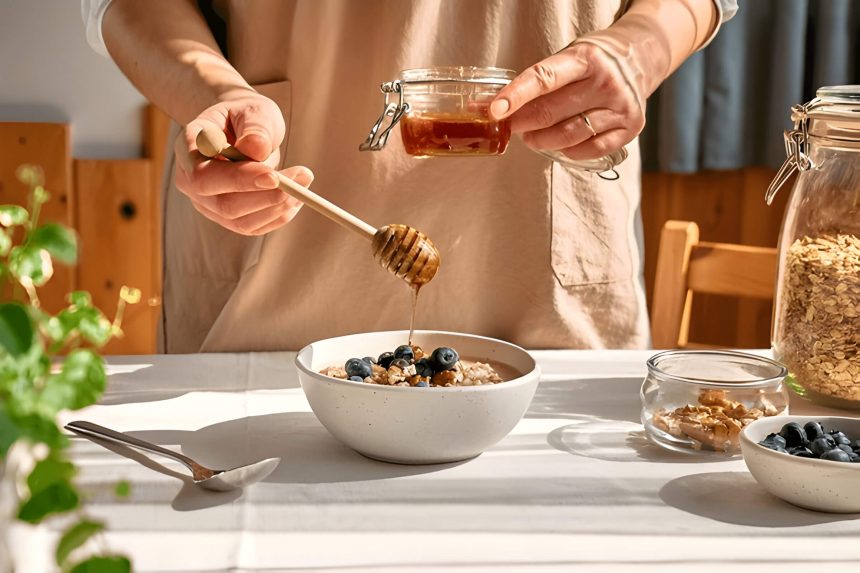In recent years, the ketogenic diet has gained significant popularity as a weight loss and health optimization strategy. This low-carb, high-fat eating plan aims to induce a state of ketosis, where the body burns fat for fuel instead of carbohydrates. However, as more people adopt this diet, questions arise about the compatibility of certain foods, including honey, with the keto lifestyle. This article explores the relationship between honey and the ketogenic diet, examining its nutritional profile, potential benefits, and alternatives
A Brief Overview of the Keto Diet
The ketogenic diet, commonly known as the keto diet, is a low-carb, high-fat eating plan that has gained significant popularity in recent years. At its core, the diet aims to shift the body’s primary fuel source from carbohydrates to fat, inducing a metabolic state called ketosis.
The fundamental principle of the keto diet lies in its strict carb restriction. Typically, followers limit their carbohydrate intake to 20-50 grams per day, which is significantly lower than the average Western diet. This drastic reduction in carbs forces the body to burn fat for energy, leading to the production of ketones in the liver.
To achieve the desired macronutrient ratios, a standard ketogenic diet consists of approximately 70-75% fat, 20-25% protein, and only 5-10% carbohydrates. This unique balance encourages the body to become more efficient at burning fat, potentially leading to weight loss and improved metabolic health.
While the keto diet has shown promise for weight management and certain medical conditions, it’s essential to understand that it may not be suitable for everyone. As with any significant dietary change, it’s advisable to consult with a healthcare professional before embarking on a ketogenic eating plan.
The Nutritional Profile of Honey (Carbs, Calories, and Benefits)
Honey, a natural sweetener produced by bees, has a unique nutritional profile that sets it apart from refined sugars. Primarily composed of carbohydrates, honey contains approximately 17 grams of carbs per tablespoon, with most of these being simple sugars like fructose and glucose. This composition gives honey its characteristic sweetness and provides a quick energy source.
In terms of caloric content, a tablespoon of honey typically contains about 64 calories. While this may seem high, honey’s intense sweetness means that less is often needed compared to other sweeteners, potentially leading to lower overall calorie intake.
One of honey’s standout features is its rich antioxidant content. These compounds, including flavonoids and phenolic acids, contribute to honey’s potential health benefits. Research suggests that these antioxidants may help combat oxidative stress in the body and support overall health.
It’s important to note that honey’s exact nutritional profile can vary depending on factors such as the type of flowers the bees visited and the processing methods used. However, regardless of these variations, honey remains a natural alternative to refined sugars, offering both sweetness and potential health benefits.
Can Honey and Ketosis Coexist?

While honey is often praised for its natural sweetness and potential health benefits, its compatibility with a ketogenic diet remains a topic of debate. The carb limit on keto is typically very low, ranging from 20 to 50 grams per day, which poses a challenge for honey consumption. Honey has a relatively high glycemic index, meaning it can rapidly impact blood sugar levels when consumed.
One tablespoon of honey contains approximately 17 grams of carbohydrates, which could easily push someone over their daily carb limit on a strict ketogenic diet. This sudden influx of sugar can potentially disrupt ketone levels, the cornerstone of ketosis. The metabolic effects of honey consumption may temporarily shift the body out of its fat-burning state, as insulin levels rise to process the incoming glucose.
However, it’s worth noting that the impact of honey on ketosis can vary from person to person. Some individuals may be able to incorporate small amounts of honey into their diet without significantly affecting their ketone levels, especially if they’re following a more flexible approach to keto. Ultimately, those strictly adhering to a ketogenic diet should be cautious with honey consumption and consider alternatives that have a lower impact on blood sugar levels.
Alternatives to Honey for Keto Dieters
For those following a ketogenic diet, finding suitable alternatives to honey can be crucial for maintaining ketosis while still satisfying sweet cravings. Fortunately, there are several keto-friendly sweeteners available that can serve as excellent substitutes.
Stevia, a natural sweetener derived from the Stevia rebaudiana plant, is a popular choice among keto dieters. It’s calorie-free and doesn’t impact blood sugar levels, making it ideal for those watching their carbohydrate intake.
Erythritol, a sugar alcohol, is another excellent option. It has a similar taste and texture to sugar but contains virtually no calories and has a minimal effect on blood glucose.
Monk fruit sweetener, extracted from the monk fruit, is gaining popularity in the keto community. It’s natural, zero-calorie, and doesn’t raise blood sugar levels.
While artificial sweeteners like aspartame and sucralose are technically keto-friendly due to their lack of carbohydrates, some individuals prefer to avoid them. It’s important to note that everyone’s tolerance to different sweeteners can vary, so it’s best to experiment and find what works best for your individual needs and preferences while maintaining ketosis.
Small Amounts of Honey on Keto (Pros and Cons)
While honey is generally considered high in carbohydrates, some keto dieters choose to incorporate small amounts into their meal plans through careful portion control and carb budgeting. This approach allows for a touch of sweetness while potentially reaping some of honey’s health benefits. Raw honey contains antioxidants, enzymes, and antimicrobial properties that may support overall wellness.
However, it’s crucial to remember that even small amounts of honey can impact ketosis for some individuals. The glycemic index of honey is relatively high, which means it can cause a rapid spike in blood sugar levels. This effect may vary depending on individual tolerance and metabolic factors.
When considering honey on a keto diet, it’s essential to weigh the potential drawbacks against the benefits. Some people may find that the small amount of honey fits within their daily carb limit without disrupting ketosis, while others may experience a negative impact on their blood sugar levels or struggle to maintain ketosis.
Ultimately, the decision to include honey in a keto diet should be based on personal goals, carb tolerance, and careful monitoring of ketone levels.
Recipes and Tips for Incorporating Honey into a Keto Diet
While honey is typically high in carbohydrates, there are ways to incorporate small amounts into a keto diet without derailing your progress. When using honey in keto-friendly recipes, it’s crucial to balance your macros carefully and use it sparingly. Consider these tips and recipes:
- Honey substitutes: For low-carb baking, try using sugar-free honey alternatives like monk fruit sweetener or erythritol to achieve a similar taste without the carbs.
- Keto honey glazes: Create a thin honey glaze for meats by mixing a small amount of raw honey with apple cider vinegar and herbs. Use sparingly to add flavor without significantly impacting carb intake.
- Honey-mustard dressing: Combine a teaspoon of honey with Dijon mustard, olive oil, and apple cider vinegar for a tangy, low-carb salad dressing.
- Keto desserts: Incorporate tiny amounts of honey into fat bombs or chia seed puddings, ensuring the overall carb count remains low.
- Balancing macros: When using honey, compensate by reducing carbs from other sources in your daily intake to maintain ketosis.
Remember, moderation is key when including honey in a keto diet. Always calculate the carbohydrate content and adjust your meals accordingly to stay within your daily carb limit.
Making Informed Choices on Your Keto Journey
As we conclude our exploration of honey and the ketogenic diet, it’s clear that navigating this sweet terrain requires careful consideration. While honey offers some nutritional benefits, its high carbohydrate content poses challenges for those strictly adhering to a keto lifestyle. However, the decision to include or exclude honey from your diet ultimately depends on your individual goals, health status, and how your body responds to different foods.
Remember that the ketogenic diet is not a one-size-fits-all approach. Some individuals may find they can incorporate small amounts of honey occasionally without disrupting ketosis, while others may need to avoid it entirely. It’s crucial to listen to your body, monitor your ketone levels, and consult with a healthcare professional or registered dietitian who can provide personalized advice.
If you choose to include honey in your keto diet, do so mindfully and in moderation. Consider alternatives like stevia, erythritol, or monk fruit sweetener for a lower-carb option that can satisfy your sweet tooth without compromising your ketogenic state.
The key to success on any diet is sustainability and overall health. Whether you decide to include honey or not, focus on maintaining a well-balanced, nutrient-dense diet that aligns with your health objectives and makes you feel your best.
